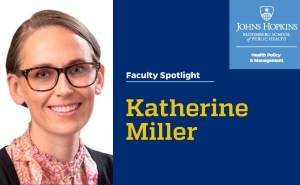New Study Reveals Millions of Young Americans Provide Essential Care to Adults
Time spent caregiving impacts young adults’ educational opportunities and achievements.

Family caregivers are often the primary providers of long-term care in the U.S. A new study by researchers at the Bloomberg School sheds light on the often-overlooked role of youth and young adults as caregivers in the U.S. The study estimates that millions of young Americans between the ages of 15 and 22 are providing essential care to adults, significantly impacting those young people’s educational opportunities and achievements. Katherine Miller, PhD, assistant professor in Health Policy and Management, was the lead author of the paper, which was published online in the Journal of Adolescent Health in May.
The research utilized data from the American Time Use Survey (ATUS) and the Current Population Survey from 2013 to 2019. The study employed multiple definitions of caregiving, including aiding with activities of daily living (ADLs) and instrumental activities of daily living (IADLs), to capture a comprehensive picture of youth caregiving in the U.S.
The study reveals that an estimated 1.6 million youth (ages 15–18) and 2 million young adults (ages 19–22) are caregivers, representing 9.2% and 12.7% of their respective age groups. Notably, there is significant variation in the annual number of youth caregivers, with estimates ranging from 364,000 to 2.8 million for youth and 353,000 to 2.2 million for young adults, depending on the definition of caregiving used.
Additionally, the research indicates that youth caregivers are more likely to be non-White, with a nearly equal distribution of male and female caregivers, contrasting with the predominance of female caregivers in the adult population. The study also highlights that both youth and young adult caregivers face educational disadvantages compared to their non-caregiving peers. They are less likely to be enrolled in school and spend significantly less time on educational activities, which may have long-term implications for their educational attainment and economic stability.
The study found a stark contrast in educational engagement between caregivers and their non-caregiving counterparts. Youth caregivers spend approximately 25 minutes per day on caregiving activities, which detracts from time that could be spent on educational and work-related tasks. Specifically, youth caregivers spend 42 fewer minutes per day on educational activities and 31 fewer minutes in class, compared to their peers.
For young adult caregivers, the trend is similar. They spend around 26 minutes daily on caregiving, which translates to 38 fewer minutes per day on educational pursuits. Among those enrolled in full-time education, young adult caregivers spend 71 fewer minutes on educational activities and 15 fewer minutes in class each day compared to non-caregivers.
The study highlights that 27% of youth caregivers are not enrolled in school, compared to 18% of their non-caregiving peers. For young adults, 63% of caregivers are employed compared to 67% of non-caregivers, and 42% are enrolled in school compared to 46% of their peers.
“It's really compelling to look at the potential long-term consequences of youth and college-age individuals and the trade-offs that they make to provide care,” said Miller.
Given the negative impact of caregiving on education, the study underscores the urgent need for policies supporting youth and young adult caregivers. The findings suggest that caregiving responsibilities during formative years can have long-term effects on educational attainment and economic stability, potentially contributing to intergenerational inequalities.
The analysis revealed that caregiving among youth is often a response to conditions related to aging, and the study meticulously documented the time spent on various activities by caregivers and non-caregivers alike.
As the U.S. population ages, the reliance on family caregivers, including youth, is likely to increase. Therefore, recognizing and addressing the unique challenges faced by youth caregivers is essential for their well-being and future prospects.





